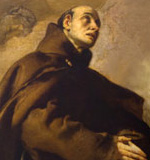Saint of the Day Online - St. Paschal Baylon
Saint of the Day for Wednesday, May 17th, 2017
17-05-2017 Saint Name: St. Paschal Baylon
Saint Name: St. Paschal Baylon
Torrehermosa, Aragon
Feast: 17 May
Birth: 1540
Death: 1592
Franciscan lay brother and mystic. Born to a peasant family at Torre-Hermosa, in Aragon, on Whitsunday, he was christened Pascua in honor of the feast. According to accounts of his early life, Paschal labored as a shepherd for his father, performed miracles, and was distinguished for his austerity.
He also taught himself to read. Receiving a vision which told him to enter a nearby Franciscan community, he became a Franciscan lay brother of the Alcantrine reform in 1564 and spent most of his life as a humble doorkeeper. He practiced rigorous asceticism and displayed a deep love for the Blessed Sacrament, so much so that while on a mission to France, he defended the doctrine of the Real Presence against a Calvinist preacher and in the face of threats from other irate Calvinists. Paschal died at a friary in Villareal and was canonized in 1690. In 1897 Pope Leo XIII declared him patron of all eucharistic confraternities and congresses. Since 1969, his veneration has been limited to local calendars.
He was born at Torrehermosa, in the Kingdom of Aragon, on 16 May 1540, on the Feast of Pentecost, called in Spain "the Pasch (or "Passover") of the Holy Ghost", hence the name Paschal. His parents, Martin Baylon and Elizabeth Jubera, were poor peasants. He spent his youth as a shepherd. He would carry a book with him and beg passersby to teach him the alphabet and to read, and as he toiled in the fields he would read religious books.
In around 1564, he joined the Reformed Franciscan Order (Alcantarine Reform) as a lay brother. He chose to live in poor monasteries because, he said, "I was born poor and am resolved to die in poverty and penance." He lived a life of poverty and prayer, even praying while working, for the rest of his life.
He was a mystic and contemplative, and he had frequent ecstatic visions. He would spend the night before the altar in prayer many nights. At the same time, he sought to downplay any glory that might come from this piety. He died on 17 May, which is his current feast day, in 1592